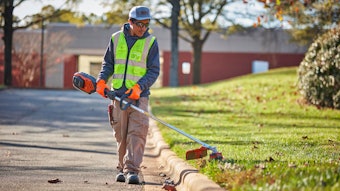
Equipment dealer Marvin Cowley also used to be a landscape contractor. He knows firsthand how easy it is to get caught off guard when spring finally springs—especially for contractors in the snowbelt who stay busy plowing snow in the off season.
Recently, though, more and more landscape contractors have had trouble with their string trimmers, hedgetrimmers, leaf blowers and other handheld equipment. Cowley, the owner of All Seasons Equipment in Eugene, OR, says the problems are largely the result of fuel issues.
"My best advice to a landscape contractor is to have a pre-season service system in place," Cowley says. Several weeks before the season typically starts is a good time to start up and test out every piece of equipment you have.
Beyond that, Cowley adds, contractors should have a system for tracking the performance of every piece of equipment in their fleet—which includes a timeframe for when a piece of equipment will be taken out of production and replaced. "Why pay a dealer like me $100 to fix something that is likely to break down again in the near future," Cowley asks.
That said, even newer equipment can run into problems. The prevalence of ethanol-blended fuels seems to be creating more as of late, especially for two-cycle handheld equipment.
Don't add bad fuel to the fire
"I'm selling more carburetors a week than I did throughout my first 15 years in business," Cowley relates. "In the past, a dirty carburetor could be cleaned out pretty easy. Not now; it's really hard to get the gummy film out. So I'm just replacing more carburetors these days." Fortunately, Cowley adds, the price has come down on some carburetors, so it's not as costly for his customers as it could be.
Cowley says the 10% ethanol in fuel is to blame. You can visit greenindustrypros.com/10265955 for more insights into how and why. Regardless, the end result is more headache in an already headache-riddled business. For Cowley and his customers, ethanol fuel additives have been a huge help.
"I'm selling a case of Star Tron a day," Cowley points out, in reference to the enzyme treatment for ethanol-blended fuel. "Once one of my customers tries it, they keep coming back to buy more. It really works." Cowley also adds Star Tron to the fuel at his dealership, which is used to gas up the new and used equipment he sells and/or services.
Cowley says E10 (10% ethanol) fuel is the prevalent fuel in his area. E10 has caused some issues for some of his customers' mowers. But the main problem resides with two-cycle equipment. "Anytime you're mixing oil with gas, it's compounding the problem," Cowley explains. "You better have good gas from the start and use it up pretty quick."
The longer ethanol-blended fuel sits around, the more problems it can cause. Some of Cowley's customers are taking steps to avoid ethanol-blended fuel, driving longer distances to stations which tout an ethanol-free option. The problem there, Cowley says, is that these customers then "stock up" and buy a large volume of fuel all at one time. That's not a bad idea—if you're in a position to use that fuel up in a timely manner. A better alternative, though, might be adding a fuel additive like Star Tron to an ethanol-blended fuel that is legal to use in lawn equipment, such as E10. "For my customers, this is proving to be a more convenient and more cost-effective way to go," Cowley adds.
EDITOR'S NOTE: Anything more than 10% ethanol, including E15, is not safe for use in lawn equipment. Visit greenindustrypros.com/11198668 for more information.



























